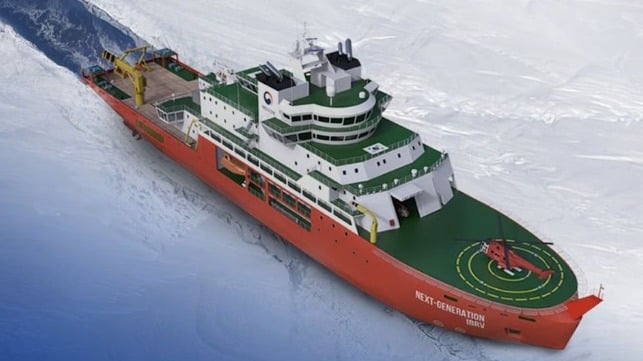South Korea Offers Financial Support for Building Ice-Class Vessels

South Korea plans to inject significant government support into its Arctic shipping plans, including a subsidy for icebreaking vessels.
Earlier this month, oceans minister Chun Jae-Soo revealed that the government will offer financial support to accelerate building of ice-class ships. This followed a recent announcement that Korea would start pilot operations in Arctic shipping next year. South Korean President Lee Jae Myung campaigned on the agenda of leveraging Arctic shipping to revive the country’s southern ports.
To fund these plans, the Ministry of Oceans and Fisheries (MOF) has been allocated $5.2 billion for the 2026 financial year, representing 8.4% increase from the current budget of $4.8 billion. The bigger budget will help facilitate expansion of the Arctic shipping routes, with support earmarked to prepare ports and construction of ice-class vessels.
“We will invest $8 million per vessel built with icebreaking capabilities for operation on the Arctic shipping routes,” said Minister Chun. He added that the icebreakers are likely to start operations in the Arctic from 2030, citing a study from the Korean Pohang University of Science and Technology (POSTECH).
South Korean shipbuilders have experience in constructing ice-class vessels. The shipyards including Hanwha Ocean and Samsung Heavy Industries have in the past delivered icebreakers for Russian projects. The yards are now shifting focus to build for South Korean clients. In July, Hanwha Ocean announced that it will be building a $200 million icebreaking research vessel for the Korean Polar Research Institute, scheduled for delivery in 2029.

that matters most
Get the latest maritime news delivered to your inbox daily.
Additionally, MOF has allocated $1.1 billion to position southern ports for Arctic shipping. Most of the fleet serving the Arctic route passes near the Korean Peninsula. For this reason, South Korea is upgrading its ports including Busan, Yeosu and Gwangyang to handle Arctic shipping. With the reported growth of shipping along the Northern Sea Route, South Korea wants to leverage on this surge to retain its southern region as a global maritime hub.
Chun confirmed that the MOF will be relocating to Busan as a show of commitment to revitalize the maritime sector in the southern region. The ministry is currently based in Sejong city, together with other central government agencies.
